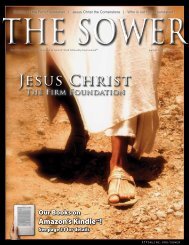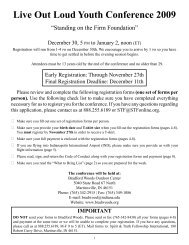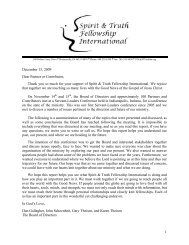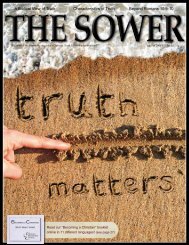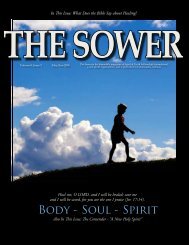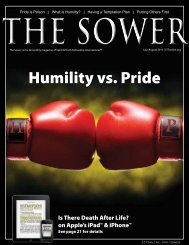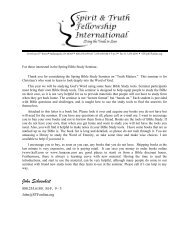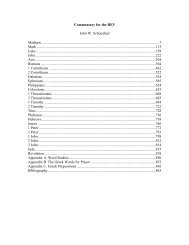Glory in the highest heavens to God... - Spirit & Truth Fellowship ...
Glory in the highest heavens to God... - Spirit & Truth Fellowship ...
Glory in the highest heavens to God... - Spirit & Truth Fellowship ...
Create successful ePaper yourself
Turn your PDF publications into a flip-book with our unique Google optimized e-Paper software.
The mature relationships between<br />
mo<strong>the</strong>r and son, and s<strong>in</strong>ner and Savior,<br />
no doubt <strong>to</strong>ok some time <strong>to</strong> develop.<br />
Their relationship was perhaps made<br />
more complex because, at some po<strong>in</strong>t<br />
before Jesus started his m<strong>in</strong>istry, Joseph<br />
died. Although Scripture does not<br />
directly say that, Joseph’s conspicuous<br />
absence <strong>in</strong> <strong>the</strong> Gospel narratives dur<strong>in</strong>g<br />
<strong>the</strong> years of Jesus’ m<strong>in</strong>istry allows us<br />
<strong>to</strong> draw this conclusion with certa<strong>in</strong>ty.<br />
Thus, Mary, now <strong>the</strong> family matriarch,<br />
would tend <strong>to</strong> oversee <strong>the</strong> family more<br />
decisively than she o<strong>the</strong>rwise may have<br />
done. One example of Mary still act<strong>in</strong>g<br />
as his mo<strong>the</strong>r, and perhaps be<strong>in</strong>g a little<br />
pushy, occurred early <strong>in</strong> his m<strong>in</strong>istry<br />
at <strong>the</strong> wedd<strong>in</strong>g at Cana (John 2:1-11).<br />
Mary po<strong>in</strong>ted out that <strong>the</strong> host ran out<br />
of w<strong>in</strong>e. Jesus answered her politely<br />
but firmly, address<strong>in</strong>g her as “woman.”<br />
It is much harsher <strong>in</strong> English than <strong>in</strong><br />
Greek. It was a polite but appropriately<br />
distant way of address<strong>in</strong>g her, show<strong>in</strong>g<br />
that Jesus had begun <strong>to</strong> def<strong>in</strong>e his life<br />
as Lord and Savior. He had faced <strong>the</strong><br />
Devil himself <strong>in</strong> <strong>the</strong> wilderness of<br />
Judea, his m<strong>in</strong>istry had begun, and<br />
it would be different than his mo<strong>the</strong>r<br />
imag<strong>in</strong>ed. Earthly relationships were<br />
be<strong>in</strong>g subjugated <strong>to</strong> div<strong>in</strong>e mission.<br />
Perhaps Mary rem<strong>in</strong>ded herself<br />
of how surprised she was <strong>to</strong> learn<br />
from Gabriel that <strong>the</strong> Messiah would<br />
be born of a virg<strong>in</strong>. If she did, it no<br />
doubt helped her keep <strong>in</strong> perspective<br />
how surprised she was at <strong>the</strong> way <strong>the</strong><br />
m<strong>in</strong>istry of her son was play<strong>in</strong>g out.<br />
She even got <strong>to</strong> <strong>the</strong> po<strong>in</strong>t of th<strong>in</strong>k<strong>in</strong>g<br />
that Jesus had lost his m<strong>in</strong>d about his<br />
mission and purpose, and rounded<br />
up her o<strong>the</strong>r sons <strong>to</strong> br<strong>in</strong>g him home<br />
(Matt. 12:46; Mark 3:21 and 31). Jesus<br />
was not try<strong>in</strong>g <strong>to</strong> be rude <strong>to</strong> his family<br />
when he did not go out <strong>to</strong> greet <strong>the</strong>m,<br />
but <strong>in</strong>stead looked at those around him<br />
and said, “Who are my mo<strong>the</strong>r and my<br />
bro<strong>the</strong>rs Whoever does <strong>God</strong>’s will<br />
is my bro<strong>the</strong>r and sister and mo<strong>the</strong>r”<br />
(Mark 3:33a and 35). Jesus was try<strong>in</strong>g<br />
<strong>to</strong> get his family <strong>to</strong> realize what <strong>the</strong>y<br />
must come <strong>to</strong> know if <strong>the</strong>y were <strong>to</strong> be<br />
saved, that <strong>the</strong>y all had <strong>to</strong> become his<br />
followers and disciples, for he was <strong>the</strong><br />
Messiah.<br />
A Disciple of Christ<br />
It is not surpris<strong>in</strong>g that <strong>the</strong> spunky,<br />
godly teenager who <strong>God</strong> picked <strong>to</strong> be<br />
<strong>the</strong> mo<strong>the</strong>r of His only Son would grow<br />
and mature <strong>to</strong> be an important member<br />
of <strong>the</strong> early Church. Never<strong>the</strong>less, <strong>the</strong>re<br />
is no h<strong>in</strong>t that she ever tried <strong>to</strong> throw<br />
her weight around as “<strong>the</strong> mo<strong>the</strong>r of<br />
Jesus.” The humility she showed <strong>in</strong> her<br />
teenage years, when she called herself<br />
<strong>the</strong> “slave-maid” of <strong>the</strong> Lord, was<br />
still present when, <strong>in</strong> her mid-forties,<br />
she s<strong>to</strong>od at <strong>the</strong> foot of <strong>the</strong> cross and<br />
looked up at her son and Lord. There<br />
is no evidence that she unders<strong>to</strong>od<br />
more than <strong>the</strong> o<strong>the</strong>r disciples. Like<br />
<strong>the</strong> rest, it seems clear that she did<br />
not comprehend his substitutionary<br />
death for all mank<strong>in</strong>d. Never<strong>the</strong>less,<br />
she quietly accepted his direction<br />
<strong>to</strong> go home with <strong>the</strong> Apostle John<br />
(John 19:25-27) and unders<strong>to</strong>od <strong>the</strong><br />
appropriate distance <strong>in</strong> <strong>the</strong> relationship<br />
when Jesus aga<strong>in</strong> addressed her as<br />
“woman.”<br />
The last mention of Mary is <strong>in</strong><br />
Acts 1:14, after her son ascended <strong>in</strong><strong>to</strong><br />
heaven. The disciples had assembled<br />
<strong>in</strong> Jerusalem and she was counted<br />
among <strong>the</strong>m. Her work as <strong>the</strong> mo<strong>the</strong>r<br />
of <strong>the</strong> only Son of <strong>God</strong> was done,<br />
and her place was <strong>in</strong> <strong>the</strong> Church, as<br />
a disciple. Many people <strong>to</strong>day go <strong>to</strong><br />
great lengths <strong>to</strong> be “someone great.”<br />
Mary showed us that true greatness<br />
comes from plac<strong>in</strong>g your life <strong>in</strong> <strong>God</strong>’s<br />
hands and do<strong>in</strong>g whatever He calls you<br />
<strong>to</strong> do. She accepted <strong>the</strong> task that <strong>God</strong><br />
assigned her <strong>in</strong> spite of its difficulty,<br />
and she lived with humility and great<br />
faith, even <strong>in</strong> becom<strong>in</strong>g a disciple of<br />
her son, <strong>the</strong> Christ. You do not get any<br />
greater than that.<br />
Notes:<br />
1. The genealogy of Mary is recorded <strong>in</strong><br />
Mat<strong>the</strong>w 1:2-16. It is often thought that<br />
Mat<strong>the</strong>w conta<strong>in</strong>s Joseph’s genealogy<br />
and Luke conta<strong>in</strong>s Mary’s, but this cannot<br />
be correct. For one th<strong>in</strong>g, Mary is never<br />
mentioned <strong>in</strong> Luke, while Joseph is <strong>the</strong> last<br />
person <strong>in</strong> Luke’s genealogy. Fur<strong>the</strong>rmore,<br />
Mary is <strong>in</strong> <strong>the</strong> genealogy <strong>in</strong> Mat<strong>the</strong>w 1:16,<br />
between Joseph (her fa<strong>the</strong>r) and Jesus (her<br />
son). The reason for <strong>the</strong> confusion is that <strong>in</strong><br />
almost all versions, Joseph is said <strong>to</strong> be <strong>the</strong><br />
“husband” of Mary. Although <strong>the</strong> Greek<br />
word most versions translate “husband” is<br />
normally translated that way, it does not<br />
have <strong>to</strong> be, and <strong>in</strong> <strong>the</strong> Aramaic text, <strong>the</strong><br />
word is more normally translated fa<strong>the</strong>r,<br />
and a completely different word, mean<strong>in</strong>g<br />
‘husband,” is used just three verses later<br />
<strong>in</strong> verse 19. When Joseph is counted as<br />
Mary’s fa<strong>the</strong>r, and <strong>the</strong>n Mary and Jesus<br />
are counted, <strong>the</strong>re are <strong>in</strong>deed fourteen<br />
generations from <strong>the</strong> exile <strong>to</strong> Babylon<br />
<strong>to</strong> Jesus, just as Mat<strong>the</strong>w 1:17 says. For<br />
fur<strong>the</strong>r study, visit <strong>Truth</strong>OrTradition.com/<br />
genealogy<br />
2. We believe Jesus was born <strong>in</strong> mid-<br />
September (Cp. Ernest Mart<strong>in</strong>, The<br />
Star that As<strong>to</strong>nished <strong>the</strong> World; ASK<br />
Publications, Portland, OR, 1996, pp.<br />
67-102). That would mean that Mary was<br />
impregnated by <strong>God</strong> <strong>in</strong> December. For<br />
fur<strong>the</strong>r study on when Jesus was actually<br />
born visit <strong>Truth</strong>OrTradition.com/birth<br />
3. Scripture quotations marked (NASB)<br />
are taken from <strong>the</strong> New American Standard<br />
Bible®, © 1960, 1962, 1963, 1968, 1971,<br />
1972, 1973, 1975, 1977 by The Lockman<br />
Foundation. Used by permission.<br />
4. The Hebrew word that most English<br />
versions translate “virg<strong>in</strong>” (almah)<br />
does not have <strong>to</strong> be translated that way,<br />
and can refer <strong>to</strong> a young woman who<br />
is not necessarily a virg<strong>in</strong>, as many<br />
commentaries admit. This is especially<br />
important when we realize that <strong>the</strong>re is<br />
a Hebrew word that more naturally does<br />
refer <strong>to</strong> a virg<strong>in</strong> (bethula). The Jewish<br />
Publication Societies Bible says “young<br />
woman,” as do some Christian Bibles<br />
such as <strong>the</strong> RSV*1, NRSV*2, and Moffatt<br />
Bible.*3 Fur<strong>the</strong>rmore, <strong>the</strong> future tense,<br />
“shall conceive” may be also translated<br />
“is pregnant,” as is represented <strong>in</strong> those<br />
same versions. Given <strong>the</strong> fact that Isaiah<br />
7:14 does not demand a virg<strong>in</strong> birth, but<br />
can refer <strong>to</strong> a natural pregnancy and birth,<br />
it is no wonder that <strong>the</strong> Jewish people<br />
thought <strong>the</strong> birth of <strong>the</strong> Messiah would be<br />
a natural childbirth, and that is especially<br />
true when we take <strong>in</strong><strong>to</strong> account that no<br />
o<strong>the</strong>r verse <strong>in</strong> <strong>the</strong> Old Testament clearly<br />
supports a virg<strong>in</strong> birth. The wonderful<br />
th<strong>in</strong>g about <strong>the</strong> Hebrew text <strong>in</strong> Isaiah 7:14<br />
is that allows for, but does not demand, a<br />
virg<strong>in</strong> birth, so <strong>the</strong> text can readily apply<br />
<strong>to</strong> <strong>the</strong> virg<strong>in</strong> birth of Christ. *1 Scripture<br />
quotations marked (RSV) are taken from<br />
<strong>the</strong> Revised Standard Version of <strong>the</strong> Bible,<br />
© 1952, 1971 by <strong>the</strong> Division of Christian<br />
Education of <strong>the</strong> National Council of <strong>the</strong><br />
Churches of Christ <strong>in</strong> <strong>the</strong> United States of<br />
America. All rights reserved. *2 Scripture<br />
(cont<strong>in</strong>ued on page 26)<br />
The Sower Nov/Dec 2007 21



